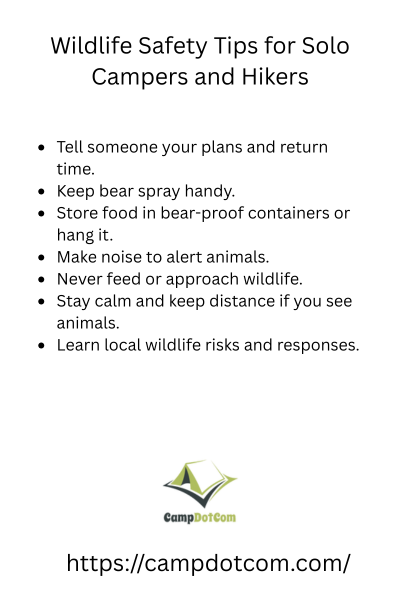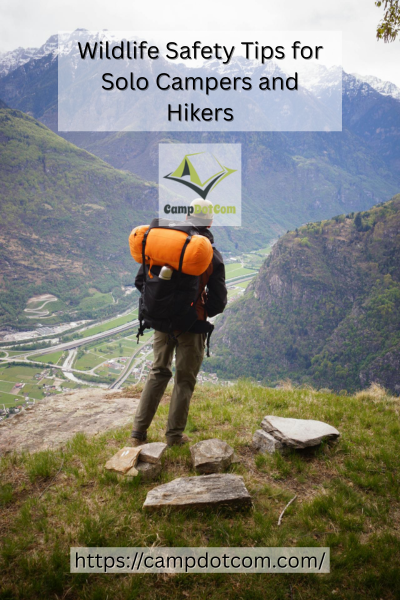If you’re like me, there’s something magical about heading into the wild solo. The quiet, the freedom, and yep, the chance to really connect with nature on your own terms. But let’s be honest—wildlife encounters can get a little nerve-wracking, especially when you’re a solo camper or hiker. That’s why I’m super excited to share some wildlife safety tips for solo campers and hikers that have helped me feel confident and safe out there.
Read More About Wildlife Safety Tips for Solo Campers and Hikers

Why Solo Outdoor Adventures Need Special Wildlife Safety Tips
Going solo means you don’t have a buddy to watch your back or help if things go sideways. Wildlife doesn’t always stick to the “stay away” rule, and sometimes you’ll run into curious or even aggressive animals. So it’s crucial to have a plan and know what to do. Trust me, once I learned a few key safety moves, I actually started enjoying solo trips way more because I wasn’t constantly on edge.
More Things to Know About Wildlife Safety Tips for Solo Campers and Hikers

Know Your Neighborhood: Research Before You Go
First thing I do before any solo trip is a little homework. What kind of critters live in the area? Bears, snakes, mountain lions? The more you know, the better you can prepare. For example, I once went hiking in a spot known for rattlesnakes. Knowing this upfront made me extra cautious about where I stepped and where I set up camp.
As an Amazon Associate, I earn from qualifying purchases. Some of the links in this article are affiliate links. This means that, at zero cost to you, I will earn an affiliate commission if you click through the link and finalize a purchase.
Pro tip: Local ranger stations and park websites often have up-to-date wildlife info. Don’t skip this step!
Make Noise (But Not Too Much)
Animals usually want to avoid you as much as you want to avoid a surprise encounter with them. Making noise helps announce your presence, giving critters a chance to clear out. I like to chat to myself (hey, it’s a solo trip!) or tap my trekking poles rhythmically.
But here’s the catch—too much noise can stress wildlife and make them unpredictable. Find a balance, especially in quieter areas like bird sanctuaries.
Keep Food Locked and Away
Food smells like a dinner bell to wildlife. On one solo camping trip, I learned this the hard way when a raccoon tried to unzip my tent. Since then, I always hang my food in a bear bag or use a locked container. Keep your cooking and eating spots far from your sleeping area, because it is just asking for trouble to mix the two.
Carry Bear Spray or a Deterrent
Depending on where you hike, carrying bear spray or other deterrents can be a real game changer. I will be honest, I was nervous the first time I packed bear spray, but it felt like carrying peace of mind. Just make sure you know how to use it properly and keep it within reach.
Watch Your Step and Stay on Trails
I can’t tell you how many times I’ve almost stepped on a snake or disturbed a wasp nest by wandering off the trail. Staying on marked paths not only protects you but also the environment. Plus, animals are less likely to be surprised by you if you stick to the beaten path.
What to Do If You See Wildlife?
Seeing a wild animal can be both thrilling and a little scary. If you spot something, do not panic. Keep your distance, stay calm, and avoid sudden movements. I remember one time I saw a deer up close, it was such a serene moment, but I stayed quiet and let it move on in its own time.
If it is a predator, like a mountain lion or bear, back away slowly. Never turn your back or run, that can trigger a chase. Make yourself look big by raising your arms or jacket and speak firmly.
Trust Your Gut and Prepare for the Unexpected
Sometimes, despite all your best efforts, things feel off. Maybe the hair on your neck stands up or you notice unusual signs. Trust that gut feeling. I once cut a hike short because the area felt too “wild” in a way I couldn’t explain. Better safe than sorry.
Packing a whistle or a personal alarm can be helpful too. A loud, unexpected noise might scare off curious animals or alert others if you need help.
Wildlife Safety Tips for Solo Campers and Hikers
Going solo means you get to experience the wild in a unique, personal way, but it also means being extra careful, especially with wildlife. By doing your research, making smart choices about food and noise, carrying deterrents, and knowing how to react, you will turn potential stress into confidence.
I hope these wildlife safety tips for solo campers and hikers make your next adventure safer and more enjoyable. Remember, the goal is not just to survive out there, it is to thrive and maybe even come back with some stories that make your friends jealous.
Ready to hit the trail alone with peace of mind? You got this.
Got any solo outdoor stories or tips? I would love to hear what has worked for you, drop me a line anytime.
